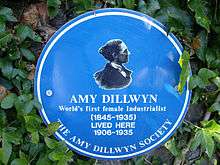Amy Dillwyn

Elizabeth Amy Dillwyn (16 May 1845 – 13 December 1935) was a novelist, businesswoman, and social benefactor. She was one of the first female industrialists in Britain.
Biography
Elizabeth Amy Dillwyn was born in Wales, UK, on 16 May 1845, in Sketty in Swansea. She was the daughter of Lewis Llewelyn Dillwyn and Elizabeth (née De la Beche). She had an older sister and brother—Mary (b. 1839) and Henry (b. 1843)—and a younger sister, Sarah (b. 1852).
Her father became a Liberal MP (1855-1892), and was the owner of the Dillwyn Spelter Works at Swansea. In 1864 her fiancé, Llewelyn Thomas of Llwynmadog, died shortly before their planned wedding. Research into Dillwyn's life has also shown a close relationship with Olive Talbot through letters, who she called her 'wife' in diaries.[1] From this, some theorize the unrequited love in her novels was inspired by this real relationship. In 1866 her mother died. Between 1880 and her father's death in 1892 she had six novels published.
_by_M._D._1853_(3947813464).jpg)
Following the deaths of her brother in 1890 and her father in 1892 Amy Dillwyn lost the family home at Hendrefoilan, but rescued her father's spelter works, which she managed herself. Her unorthodox appearance and lifestyle made her a well-known figure in the local community. When the National Union of Women's Suffrage Societies was formed at the turn of the century, Dillwyn joined as one of the earliest supporters in Wales. Although rejecting the militant actions of some members, she was still a staunch member of the movement.[2]
She died in Swansea on 13 December 1935, at the age of ninety, was cremated and her ashes buried in the churchyard of St Paul's Church, Sketty. Probate was granted to Rice Mansel Dillwyn and her estate was valued at £114,513 7s 9d.
Her house, Tŷ Glyn (now Mumbles Nursing Home), still stands at West Cross, Swansea.
Novels
Amy Dillwyn started writing in the 1870s, stating 'I've an idea I will try and write one chapter and see how I like it'.[3] The Rebecca Rioter (as The Rebecca Rioter: A Story of Killay Life) was published by Macmillan in 1880, by 'E. A. Dillwyn.' Telling the fictionalized account of a Rebecca rioter, loyal to the cause even when transported to Australia, the novel shows Dillwyn's political views, liberal toward the Rebecca riots and against English rule, despite her father's part in squashing the riots.[4][5] Both The Rebecca Riots and Chloe Arguelle were translated into Russian by liberal intelligentsia.[6] Painting and Bohata identify recurring themes in her novels of crusading social reform, unrequited love, criticism of the upper class. [7][8]Feminist concerns predominate, however, and many of her stories had tomboyish women as protagonists. Dillwyn also anonymously contributed to the Spectator regularly in the 1880s.
Works
- The Rebecca Rioter (1880) (reprinted 2004 by Honno)
- Chloe Arguelle (1881)
- A Burglary; or Unconscious Influence (1883) (reprinted 2009 by Honno)
- Jill (1884) (reprinted 2013 by Honno)
- Nant Olchfa (serialized in The Red Dragon: The National Magazine of Wales, Vols X-XI, 1886-7)
- Jill and Jack (1887)
- Maggie Steele's Diary (1892)
Further reading
- David Painting, Amy Dillwyn (1987)
- David Painting: Amy Dillwyn, Cardiff : University of Wales Press, 2013, ISBN 978-0-7083-2672-5
- Jane Aaron, Nineteenth Women's Writing in Wales: Nation, Gender and Identity, Llandybïe: University Press.
External links
- The Dilwyn Project - Research project by Swansea University
- The Life and Fiction of Amy Dillwyn - Research project by Swansea University, led by Dr. Kirsti Bohata.
References
- ↑ Bohata, Kirsti. "The Life and Fiction of Amy Dillwyn". Swansea University. Retrieved 4 March 2016.
- ↑ Painting, David (2013). Amy Dillwyn. Cardiff: University of Wales Press. p. 87. ISBN 9780708326794.
- ↑ Painting, David (2013). Amy Dillwyn. p. 60.
- ↑ Painting, David. Amy Dillwn. p. 62.
- ↑ Aaron, Jane. Nineteenth-Century Women's Writing in Wales: Nation, Gender and Identity. p. 128.
- ↑ Bohata, Kirsti & Steven Lovatt, The Russian Rioter: Amy Dillwyn's The Rebecca Rioter in Otechestvennye zapiski, in Almanac: A Yearbook of Welsh Writing in English Vol 16 (2012) 1-30.
- ↑ Painting, Amy Dillwyn (2013) 60-67
- ↑ Bohata, Kirsti, 'Introduction' to Jill, by Amy Dillwyn (Honno, 2013), vii-xxiii.